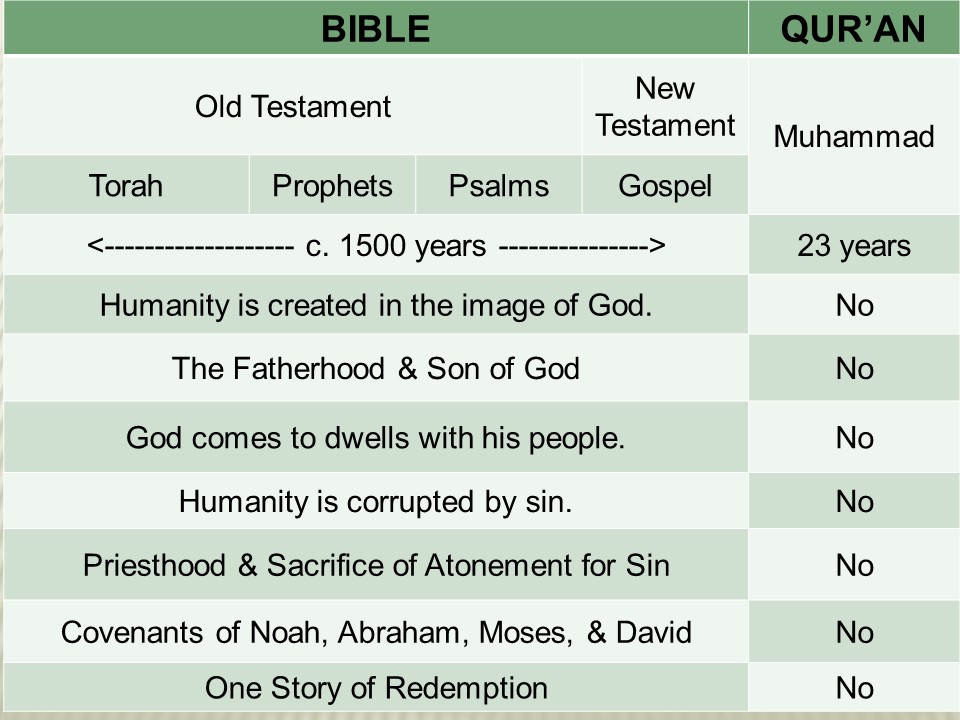A Bible for Muslims
 In the book of Acts we see the apostle Paul introduce the gospel differently to different groups. To the Jews he introduces Jesus as the fulfilment of the promises God made through the prophets. To the Gentiles he proclaims that God is the creator, idols do not represent God, and that God’s true representative is Jesus whom he raised from the dead. How would Paul introduce the gospel to Muslims?
In the book of Acts we see the apostle Paul introduce the gospel differently to different groups. To the Jews he introduces Jesus as the fulfilment of the promises God made through the prophets. To the Gentiles he proclaims that God is the creator, idols do not represent God, and that God’s true representative is Jesus whom he raised from the dead. How would Paul introduce the gospel to Muslims?
To answer this we need to think about Islamic culture and how it affects Muslims listening to the Gospel. There are two common beliefs (defeater beliefs) that most Muslims have which stop them listening to Christians:
1. Muslims believe all the prophets and so already believe in Jesus.
2. The Bible is corrupted.
These two beliefs make Muslims feel justified when they ignore the Christian message. If we want to present the Gospel to Muslims we must take these defeater beliefs into account.
So what does this mean for how we present the Gospel to Muslims? It means that the way we present it needs to demonstrate to Muslims that they do not believe all the prophets and that the Bible is not corrupt. So how do we do this?
Firstly, we need to stop using the word “Bible” and go back to the traditional category titles that the scriptures use themselves: Torah, Prophets, Psalms and Gospel. Our scriptures are not one book but many books from many prophets from different locations over about a 1500 year period. Most Muslims do not know this. They think the Bible is one book like the Qur’an and when we say “Bible” we make it sound like one book.
This is important because when Muslims say they believe all the prophets, what they mean is they believe everything Muhammad tells them about the prophets. They do not read the books of the prophets. Christianity is very different. Christians believe in Moses and read the Torah; we believe in David and read the Psalms; we believe in Jonah and read his book. Muslims do not do this; they only believe what Muhammad says about these people. In this way Islam is the same as the Bahai religion which is also based on one man who tells you what to believe about the prophets and their message. When we call our scriptures the Torah, Prophets, Psalms and Gospel we demonstrate that Christians believe, read and teach all the prophets and that Muslims only follow one man Muhammad.
Our scriptures have been given various names over the centuries and in different cultures. When speaking to Muslims we need to use the traditional titles of Torah, Prophets, Psalms and Gospel (Luke 24:44). These titles are also the titles the Qur’an uses for our scriptures. When we present the Gospel in these terms we engage with the first Islamic defeater belief.
Secondly, when we explain or defend an aspect of the Gospel, for example the Son of God, we should not do it from “the Bible” but from the Torah, then the books of the prophets, then the Psalms, and finally from the Gospel. We need to show Muslims that the Christian message is in fact the message of all the prophets. The Gospel is new but not novel. It is the fulfilment of God’s progressive revelation.
These books build on each other and are meant to be read together. Together they give us God’s complete message. What Christians believe about God comes from reading all of the books of the prophets.
This unity shows that our scriptures have not been corrupted because it is the same message throughout all the prophets. This way of explaining the Gospel engages with the second Islamic defeater belief.
It also shows that the Qur’an does not fit with the earlier prophets and that Muhammad teaches a different message to all the prophets. It is not that the Bible says one thing and the Qur’an another; it is that all the prophets say one thing and Muhammad says something else.
This is the Engaging with Islam method for explaining and defending the Gospel: Call our scriptures the Torah, Prophets, Psalms and Gospel, and explain the Gospel themes from all the prophets.
To learn more about this approach watch Christianity & Islam – Where to Start.
Here is an evangelistic leaflet that explains what the Bible is to a Muslim, What is the Bible?.
To obtain Bibles with Torah, Prophets, Psalms & Gospel on the cover click here.

